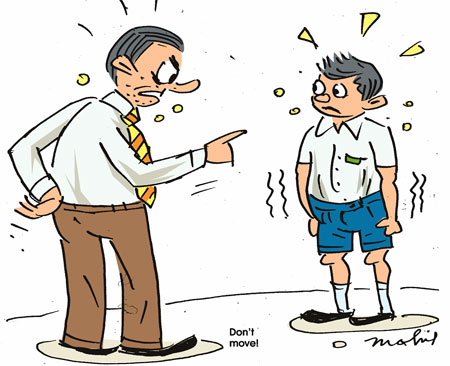|
 by
R. S. Karunaratne by
R. S. Karunaratne
Base form of verbs
The base form is the simplest form of a verb. It does not end in ‘s’,
‘ed’ or ‘ing.’
For plural noun subjects and the pronouns ‘I, you, we’ and ‘they’, we
use the base form for the present tense.
Three world-class tennis players contend for this title.
People complain about the noise.

I concentrate on my work.
Some drugs cause the blood vessels to constrict.
High winds hinder fire fighters in their efforts to put out the blaze.
We can use the verbs ‘to be’, ‘to do’, and ‘to have’ as main verbs or
auxiliary verbs.
They are teachers. (main verb)
They are teaching English. (auxiliary verb)
People do various jobs. (main verb)
Where do you work? (auxiliary verb)
Rich people have big houses. (main verb)
Have you seen Renuka? (auxiliary verb)
We use the base form of a verb to give instructions, warnings, advice or
commands.
Check the expiry date when you buy canned food. (instruction)
Don’t wait under the ladder. (warning)
Eat nutritious food. (advice)
Don’t move! (command)
Help me to cross the road, please. (request)
We use the base form of a verb to make questions.
Do you read a lot?
Don’t they know the rules?
When do you wish to return my book?
Why did he leave?
What did they tell you?
We form an infinitive by adding ‘to’ a base form of a verb.
The accountant has to finalise the accounts for the day.
I don’t know how to go there.
To err is human, forgive divine. (Proverb)
Many people came forward to help the injured man.
The management has decided to promote Rex.
A sentence with an infinitive is incomplete unless it contains a finite
verb.
We decided to cross the river by boat.
They studied well to pass the examination.
The king ordered his guards to punish the offender.
The director got up to welcome the new chairman.
The dog barked to frighten the stranger.
A non-finite verb does not change its form. However, a finite verb
changes its form according to the tense and the subject of the sentence.
The child loves to eat ice-cream.
Children love to eat ice-cream.
She loved to eat ice-cream.
They are eating ice-cream.
A verb in the past tense does not change its form according to the
subject of the sentence.
Suramya gave me a lift to Borella.
My parents gave me food and clothes.
She did the typing well.
They did the difficult part of the job.
Sarath protected me wherever I went.
The guards protected the king wherever he went.

We use the base form of a verb with all positive and negative modals.
I could do it the way you want.
She can come to office before 8.30 a.m.
May I come in?
You might lose the money.
I shall call him now.
What should I tell him?
You must be here before noon.
You mustn’t sit here.
We shouldn’t get late.
I couldn’t write the essay.
We cannot come at that time.
[Activity]
Underline the correct verbs and check your answers with they key.
1. Which books did you (borrow / borrowed)?
2. Lassie (try / tries) to do her best in her studies.
3. You might (meet / meets) him on the way.
4. The Urban Council (must / hopes) repair the roads promptly.
5. The bank agreed to (refund / refunds) the money I had paid.
6. Please (inform / informs) the teachers that the principal has
resigned.
7. The tourists didn’t (expect / expected) the island to be so
beautiful.
8. Doesn’t she (know / knows) that it is time to go?
9. (Make / Made) sure that no one tries to enter my room.
10. I (has /have) to buy a car very soon.
Key:
borrow 2. tries 3. meet 4. must 5. refund 6. inform 7. expect 8. know
9. Make 10. have
Starters:
How to use prepositions
[Part 20]
There are over 100 prepositions in English. This is a very small
number compared with the vast number of nouns, verbs and adjectives.
However, most beginners find it difficult to use prepositions
correctly.
If you follow the following guide, you will learn how to use
prepositions correctly.
Over
If one thing is over another, the first thing is directly above the
second.
There is a new bridge over the Bolgoda River.

An enemy aircraft is hovering over the army camp.
The children started picking the coins scattered all over the floor.
The principal wore a white coat over his shirt.
Father drove the jeep over the valleys and hills to reach a remote
village.
If something is on the opposite side of a road or river, we say it is
over the road or river.
The police station is just over the river.
You can buy anything in that shop over the road.
You can look over something.
Mother watched her baby over the newspaper.
When you get over a fence or parapet wall, you go across it.
The police caught the suspect before he could jump over the fence.
If you are over a particular age, you are more than that age.
Children over 16 are not eligible to participate in the contest.
If you are 70 or over, the bank will pay a higher interest.
You can have control over people or things.
Parents have no control over children who study abroad.
Man’s domination over nature has caused many environmental problems.
There are certain nouns which are typically followed by ‘over.’
Advantage, ascendancy, authority, control, dominance, dominion, hold,
influence, mastery, power, victory
Similarly, some verbs are usually followed by ‘over.’
Agonize, argue, brood, clash, disagree, drool, enthuse, fight, fret,
fuss, gloat, grieve, haggle, muse, quarrel, quibble, row, wrangle
Owing to
We use ‘owing to’ when we indicate the cause of something.
He failed the examination owing to illness.
Past
When you go past somebody or something, you pass them as you go.
We drove past a row of coconut trees.
We use ‘past’ to indicate the time.
Father returned home past midnight.
It’s half past ten.
Pending
You can do certain things pending approval.
The payment has been withheld pending board approval.
Activity
Fill in the blanks with suitable prepositions. Check your answers
with the key.
1. The boy stood .......... the burning deck.
2. Let’s begin .......... the punctuation requirements.
3. We felt a lot of sympathy .......... the beggar.
4. Do you still sympathise ............ him?
5. We were sympathetic ............ her.
6. Some employees show a lack of enthusiasm ........... their work.
7. Mother is full of regret .......... her hasty decision.
8. Try to get in touch .......... him.
9. There is not much demand ........... asbestos now.
10. I requested an increase ........... salary.
Key:
1. on 2. with 3. for 4. with 5. towards 6. for 7. for 8. with 9. for
10. in
Form adjectives from nouns
Words often come in families. You can expand your vocabulary by
becoming familiar with these word families.
In the following quiz we give you 25 nouns in Column ‘A’. Write the
relevant adjectives for each noun in Column ‘B’ and check your answers
with the key
Column A Column B
1. Movement ..............
2. Murder ..............
3. Music ..............
4. Name ..............
5. Nation ..............
6. Nature ..............
7. Necessity ..............
8. Need ..............
9. Nerve ..............
10. News ..............
11. Noise ..............
12. Normalcy ..............
13. North ..............
14. Notice ..............
15. Number ..............
16. Obedience ..............
17. Occasion ..............
18. Offence ..............
19. Office ..............
20. Operation ..............
21. Opposition ..............
22. Option ..............
23. Order ..............
24. Organisation ..............
25. Origin ..............
Key:
1. movable
2. murderous
3. musical
4. named
5. national
6. natural
7. necessary
8. needy
9. nervous
10. new
11. noisy
12. normal
13. northern
14. noticeable
15. numbered
16. obedient
17. occasional
18. offensive
19. official
20. operational
21. opposite
22. optional
23. orderly
24. organisational
25. original |


